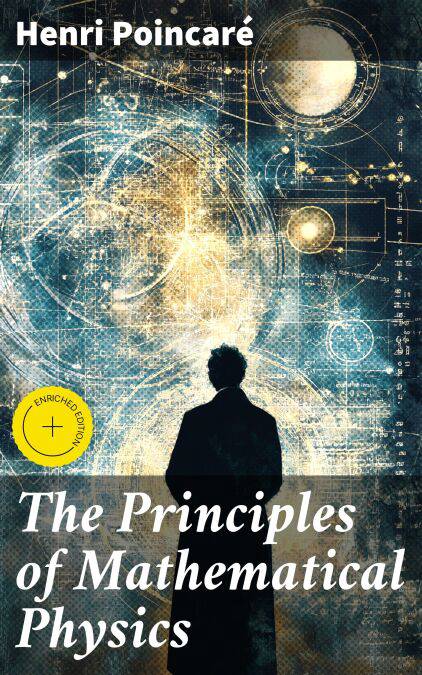
- Afhalen na 1 uur in een winkel met voorraad
- Gratis thuislevering in België vanaf € 30
- Ruim aanbod met 7 miljoen producten
- Afhalen na 1 uur in een winkel met voorraad
- Gratis thuislevering in België vanaf € 30
- Ruim aanbod met 7 miljoen producten
Zoeken
The Principles of Mathematical Physics E-BOOK
Enriched edition. Exploring Mathematical Principles in the Physical Universe
Henri Poincaré
E-book | Engels
€ 1,99
+ 1 punten
Uitvoering
Omschrijving
In "The Principles of Mathematical Physics," Henri Poincaré explores the intricate relationships between mathematics and the natural sciences, offering a profound and rigorous examination of the foundational concepts that underpin physical theories. Engaging with both the mathematical rigor and the philosophical implications of mathematical physics, Poincaré employs a clear and analytical style, reflecting the intellectual currents of late 19th-century Europe. This work serves as an essential precursor to modern physics, as it elucidates the geometric and topological aspects of physical phenomena, intertwining mathematical formalism with empirical science in a manner that paves the way for future advancements in the field. Henri Poincaré, a luminary in mathematics and the philosophy of science, was deeply influenced by the burgeoning developments of his time, including the advent of relativity and quantum mechanics. His diverse academic background, which encompassed contributions to topology, celestial mechanics, and mathematical philosophy, informed his exploration of the principles behind physical laws. Through this work, Poincaré sought not only to clarify existing theories but also to challenge conventional notions of determinism, ultimately shaping the discourse on the nature of scientific inquiry. "The Principles of Mathematical Physics" is a must-read for anyone seeking to deepen their understanding of the philosophical and mathematical foundations of physics. Poincaré's work remains remarkably relevant today, offering insights that resonate within both contemporary scientific debates and historical reflections on the evolution of thought in the sciences. Whether you are a student, professor, or a curious reader, this seminal text will enrich your perspective on the dynamic interplay between mathematics and physics.
In this enriched edition, we have carefully created added value for your reading experience:
- A succinct Introduction situates the work's timeless appeal and themes.
- The Synopsis outlines the central plot, highlighting key developments without spoiling critical twists.
- A detailed Historical Context immerses you in the era's events and influences that shaped the writing.
- An Author Biography reveals milestones in the author's life, illuminating the personal insights behind the text.
- A thorough Analysis dissects symbols, motifs, and character arcs to unearth underlying meanings.
- Reflection questions prompt you to engage personally with the work's messages, connecting them to modern life.
- Hand‐picked Memorable Quotes shine a spotlight on moments of literary brilliance.
- Interactive footnotes clarify unusual references, historical allusions, and archaic phrases for an effortless, more informed read.
In this enriched edition, we have carefully created added value for your reading experience:
- A succinct Introduction situates the work's timeless appeal and themes.
- The Synopsis outlines the central plot, highlighting key developments without spoiling critical twists.
- A detailed Historical Context immerses you in the era's events and influences that shaped the writing.
- An Author Biography reveals milestones in the author's life, illuminating the personal insights behind the text.
- A thorough Analysis dissects symbols, motifs, and character arcs to unearth underlying meanings.
- Reflection questions prompt you to engage personally with the work's messages, connecting them to modern life.
- Hand‐picked Memorable Quotes shine a spotlight on moments of literary brilliance.
- Interactive footnotes clarify unusual references, historical allusions, and archaic phrases for an effortless, more informed read.
Specificaties
Betrokkenen
- Auteur(s):
- Vertaler(s):
- Uitgeverij:
Inhoud
- Aantal bladzijden:
- 23
- Taal:
- Engels
Eigenschappen
- Productcode (EAN):
- 4064066462758
- Verschijningsdatum:
- 9/04/2021
- Uitvoering:
- E-book
- Beveiligd met:
- Digital watermarking
- Formaat:
- ePub

Alleen bij Standaard Boekhandel
+ 1 punten op je klantenkaart van Standaard Boekhandel
Beoordelingen
We publiceren alleen reviews die voldoen aan de voorwaarden voor reviews. Bekijk onze voorwaarden voor reviews.







